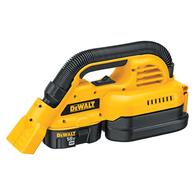DeWalt DC515K Portable Wet / Dry Vacuum
![]()
![]()
![]()
![]()
![]()
![]()
![]()
![]()

Dust is remorseless and evil and likely to be the subject of a serious documentary on Frontline one day. Aside from provoking sneezes at inconvenient moments, it shortens the life of the sorts of technology that our digs are just crawling with. Dust gets attracted to electronic components, whereupon it prevents them from cooling themselves, and eventually cooks them.
It’s probably ironic that the fans and heat sinks and such that computers and other digital toys are equipped with to dissipate their heat issues are also monster dust collectors.
A hand-held vacuum cleaner is one of the most implacable foes of dust – switched on at reasonable intervals, a small vacuum can ingest your dust bunnies and other bits of office flotsam before the aforementioned dust gets sucked into a fan and adheres itself to your chips like a liberal politician to a spending bill. It can also be used several times a year to clean the interior surfaces of your computers and other technology, a procedure which is a lamentable inconvenience but generally worth all the sweat and bother.
We’ve gotten through a substantial number of battery-powered vacuum cleaners in our quest for the prefect dust predator. For several years, we were impressed with the Dyson portable vacuum cleaners, which were visually pleasing, cool to use and generally effective. However, when our final Dyson perished in a cloud of blue smoke – and demanded almost as much in putative repair costs as we’d originally paid for the beast – we came to appreciate that “cool” wasn’t nearly as useful as “working.”
DeWalt makes thoroughly superb battery powered tools – among them, a battery-powered vacuum cleaner. The DC515K is a hand vacuum on steroids. It’s powered by the same eighteen-volt batteries that DeWalt ships with its cordless drills, saws and other industrial-strength implements of destruction. It’s formed of a lot of serious bright yellow plastic. It has a motor that could suck the wrinkles off an adult Indian elephant.
Resembling a mutant armadillo, the DC515K is something of a departure from traditional hand vacuums. While it’s relatively large and heavy, its weight is compensated for to some extent by its being comfortably balanced. It offers both a fixed air intake and a removable hose.
The DC515K couldn’t be simpler to use if it came with a full-time operator. Turn it on and point it at something you don’t like. It can clean up pretty much anything. As its name implies, this can include modest volumes of liquid, although it’s arguably a good idea to remove any dust from its collection chamber before you employ it in this capacity, lest the resulting sludge subsequently crawl out of your vacuum and apply for work at the prop department of the SciFi Channel.
One of the more notable aspects of the DC515K – especially considering that it was designed primarily for cleaning up construction sites and workshops – is its inclusion of a true HEPA filter. Better still, the filter is washable, rather than demanding frequent replacement. It will trap dust down to 0.3 microns.
The substantial battery that ships with the DC515K is a masterwork of sneakiness. It will power the vacuum for up to a quarter of an hour – something of an improvement on the three minutes running time of our Dyson vacuums. If you plug a DeWalt battery into its charger and leave it there for about eight hours, the charger will eventually enter an automatic tune-up mode that will locate the weaker cells in the battery and exercise them to maximize the running time of whatever it’s plugged into. Left still longer, the charger will maintain a battery at an optimal level of charge over long periods of inactivity.
Built like a really aggressive tank, the DeWalt DC515K promises to inhale a lot of detritus without complaint for a very long time. It’s a relatively simple machine, with few things to go wrong. Its instructions, while no doubt worth reading, are almost superfluous. It only does one thing, and does it well.
It lacks a clear plastic chamber in which its terrified victims spin helplessly in their confinement – which we’ll probably come to miss in time – but this is a small price to pay for a machine that can practically scare dust out of a room merely by entering it.